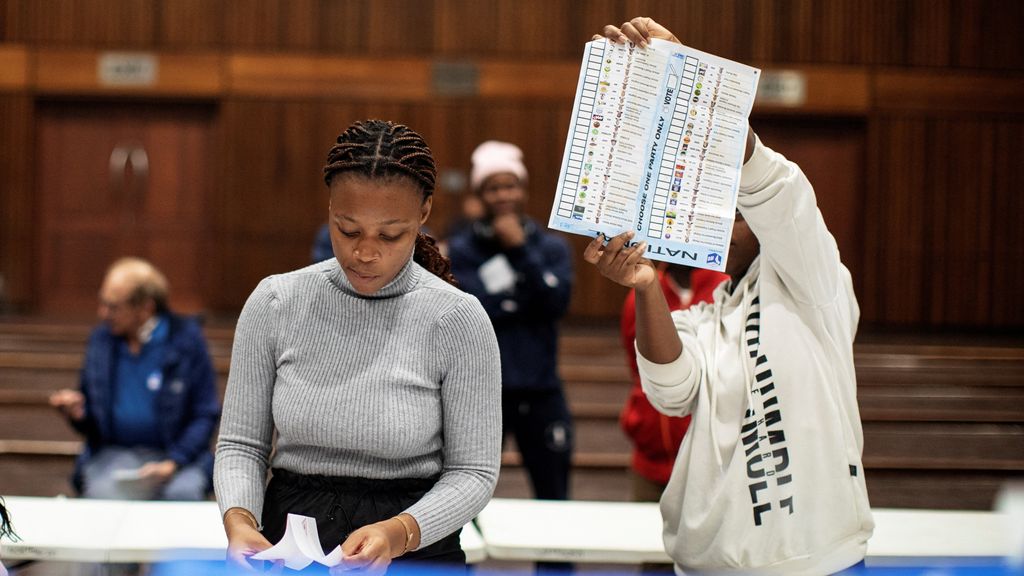Noos News•
-

Ellis Van Gelder
Africa correspondent
-

Ellis Van Gelder
Africa correspondent
The ruling African National Congress party suffered a crushing defeat in the elections that took place in South Africa. For the first time since 1994, the party lost its absolute majority. Five questions about the election results.
What went wrong with the ANC?
The ANC was in power for thirty years. Voters were loyal because of the role Nelson Mandela’s party played in the struggle against apartheid and for a free and democratic South Africa. The ANC promised a better life for all. But there is a lot of unemployment and the country suffers from energy and water shortages and high crime rates.
This is not the free and equal South Africa that the people of South Africa had hoped for, and this disappointment is now reflected in voting behaviour. Now that almost all the votes have been counted after three days, the ANC has just over 40 percent of the vote. This is much lower than in the previous elections, when the party received more than 57% of the votes. This means that most South Africans no longer want to be ruled by the party that led them in the struggle against apartheid and for democracy.
When did something go wrong?
For a long time, for example when it comes to infrastructure problems. Not enough planning has been done on how to build new water pipelines and how the country can generate more electricity. There were also many accusations of corruption and mismanagement during the era of former President Jacob Zuma (2009-2018). For example, Zuma’s friends have obtained important positions in government companies, such as the state electricity company, and close ties with Zuma have helped win him multi-million-dollar contracts.
Therefore, Zuma was forced to resign during his presidency. Current President Cyril Ramaphosa was hoisted on the shield. With him, the ANC, and many South Africans, hoped that the economy would do better and that sky-high unemployment and corruption would be addressed. But that did not happen, and voters’ patience ran out in these elections.
Why did former President Zuma’s party get so much support?
After the ANC, the Democratic Alliance received the largest number of votes (21 per cent), but the biggest surprise was that the new Umkhonto Visizwe party came in third place (14 per cent), which was joined by former President Zuma.
His party, MK, won many votes in his KwaZulu-Natal province, where many people also went to the polls. Zuma says he is committed to the poor and they feel they are heard. People also voted en masse for MK, because they share the same culture.
Moreover, Zuma says he is the victim of conspiracies against him, such as corruption allegations. He is a cat with nine lives in South Africa and loves to fight. Moreover, he was not qualified; Before the elections, the judge decided not to allow him to enter Parliament because he was found guilty of contempt of court.
What does this mean for the ANC?
The significant loss suffered by the ANC makes cooperation with only small parties difficult. Therefore, the ANC must bring together one of the larger parties in order to govern. This is not very clear. There is no party with which the party shares an ideology. For example, the Democratic Alliance – a center-right party – is still viewed by some as a party that has the interests of the business community and the middle class first. This includes more white South Africans than black South Africans, many of whom still live in poverty. The question is whether President Ramaphosa can sell such a partnership to his supporters.
The other option is to form a coalition with the MK or with the EFF and the Inkhata Freedom Party (IFP). Both MK and EFF want to nationalize mines and companies and expropriate land without compensation. Zuma’s party spokesman says they only want to form a coalition if the constitution is rewritten so that Zuma can enter parliament and be elected as the next president. The Democratic Alliance describes this as a doomsday scenario.
What does this mean for the current president?
Ramaphosa’s position depends on the alliance he chooses. An alliance with MK means the end of Ramaphosa. The Democratic Alliance has a good relationship with Ramaphosa. He must try to maintain a firm grip on the reins of his party, which has never been united since Zuma left office. Therefore, his salvation is in cooperation with the Democratic Alliance, and it seems that they want that as well.
At the same time, coalition building is a new phenomenon in South Africa, where the ANC has been in charge for the past 30 years. The constitution stipulates that they have only two weeks to form the coalition after the official results will be announced tomorrow. There are some difficult and unexpected weeks ahead.





